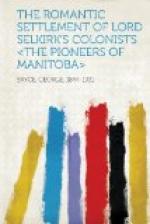Another great negative advantage was the peculiar and admirable intelligence of the great body of the population. The small circulating collection of books in their midst attracting little or no attention, their own limited to a Bible or prayer book,—many not these. With their minds in this normal healthy state, unharassed by the sordid assail of care, undepressed by any sense whatever of inferiority, unfrayed by the trituration of the average book, their powers of apprehension—singularly clear—had full scope to appropriate and resolve the world about them, which they did to such purpose as to master every exigence of their lives. Seizing upon the minutest detail affecting them they mastered as if by intuition all difficult handiwork, making with but few tools every thing they required from a windmill to a horseshoe.
Their real education was in scenes of travel or adventure in the great unbroken regions sought out by the fur trade, their retentive memories reproducing by the winter fireside or summer camp pictures so graphic as to commend themselves to every ear.
The tender heart and true of the brave old knight, Sir Thomas More, put a ban upon hunting in his Utopia. Alas and alack for the wayward proclivities of our Utopians, predaceous creatures all, hunting was to them as the breath of their nostrils, for to them, unlike the sons of Adam, it was given—with their brothers resting upon the tranquil river—to lay upon the altar of their homes alike the fruits of the earth and the spoils of the chase.
THE BUFFALO HUNT.
What pen can paint the life of the “Chasseurs of the Great Plains,” tell of the gathering of the mighty Halfbreed clan going forth—each spring and fall—in a tumult of carts and horsemen to their boundless preserves, the home of the buffaloes, whose outrangers were the grizzly bear, the branching elk, the flying antelope that skirted the great columns, the last relieving the heavy rolling gait of the herds by a speed and airy flight that mocked the eye to follow them, scouting the dull trot of the prowling wolves—attent upon the motions of their best purveyor—man.
What a going forth was theirs! this array of Hunters, with their wives and little ones; this new tribe clad in semi-savage garniture, streaming across the plains with cries of glee and joyance; the riders in their “travoie” of arms and horse equipment—the vast “brigade” of carts and bands of following horses, kept to the cavalcade by those reckless jubilants—the boys—seeming a part of the creatures they bestrode. The sunshine and the flying fleecy clouds, emulous in motion with the troop below: what life was in it all; what freedom and what breadth!
And as the sun sank apace and the guides and Headmen rode apart on some o’er-looking height and reined their cattle in, the closing up of the flying squadron for the evening camp, the great circular camp of these our Scythians proof against sudden raid crowning the landscape far and wide, seen, yet seeing every foe, whose subtle coming through the short-lived night was watched by eyes as keen as were their own.




